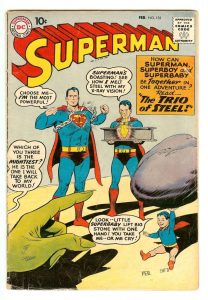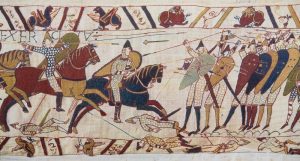When my big brother was a boy, he was besotted with comic books. This was just one of the many passions I didn’t share with him. Comic books seemed like such guy-things to me – cartoony images of violence and macho bravado, accompanied by simplistic narratives inside word balloons, such as “POW!” “WHAM!” and “BANG!”
Come to think of it, I don’t remember ever seeing my brother reading a “real” book when we were kids. Comic books were his thing: action-packed, quick-and-easy-to-read, endlessly exciting and transporting.
He can keep his comic books, I thought snootily then, along with his smooth-leather catcher’s mitt, balsa wood model airplanes, and stacks of silly baseball cards. I’ll stick with my beloved books.
My brother was never without a comic book, rolled up and partially tucked into the back pocket of his dungarees, ready in an instant to unroll and read — to kill a little time, maybe — or to thwack his little sisters with. We girls steered clear, which was just what he wanted.
My brother was born in the late-1930s, during what is known as the Golden Age of comic books, when superheroes such as Superman made their debut. This, I feel, made my brother a bona fide member of what I’ll call America’s original comic book generation.

But, I’ve learned, telling dramatic stories through the medium of sequential art, comic-book style, was nothing new. “Using images to communicate goes back to the 32nd century BC when Egyptians devised hieroglyphs with over a thousand images representing ideas,” the commanding voiceover for the video “The History of Comic Books” announces (https://www.youtube.com/watch?v=qipZ6h4S–c ).
Likewise, in medieval Europe, colorful and sometimes racy stories were depicted through lush scenes woven into tapestries for a largely illiterate public to “read.”

Giovanna Centeno, writing for BookRiot, takes the history of comic books back even further. “Illustrating a story to make it more appealing to an audience has been at the forefront of the human mind since its early existence in caves,” she says. (For her whole, fascinating article, “A Very Brief History of Comic Books,” go to: https://bookriot.com/a-very-brief-history-of-comic-books/ ).
What troubles me, I suppose, is that we’re no longer living in caves or needing to “read” things resembling hieroglyphics on pyramids or woven images on tapestries due to illiteracy. Presumably, we’ve all learned how to read written words in school. Why the current resistance to longer-form reading?
I bring all of this up now because of Facebook. Lately, Facebook has reminded me of comic books and the hold they’ve had on so many people, beginning with my brother’s generation. The Facebook posts that get “read” (and “liked”) today, it seems to me, require the least reading. Facebook “readers” prefer pictures with pithy little labels, which might as well be wrapped in word balloons. Facebook readers want to be entertained, in quick bursts – “WHAM!” – and then move on to the next colorful image. Perhaps other social media outlets are similar, but I don’t follow them.
Don’t get me wrong. I loved my brother. Adored him, really, despite our vastly different childhood interests. And I actually love aspects of Facebook, too, especially its capacity to keep me connected with so many friends, old and new, far and near. We don’t need to say much to each other; it’s enough to know they’re still there.
But I’ve been reminded recently that that skinny little snooty girl with the thick glasses and blond bangs and braids who sniffed at her big brother’s passion for comic books – the girl who loved her books so much she put them under her pillow at night, hoping that by some magic their contents would seep into her brain — still exists. What has happened to real READING?! she still wants to know. What about REAL books? She now wonders: Is this just another comic book generation? Are real-book readers a dying breed? Is the human race slipping into illiteracy? How I hope not.
